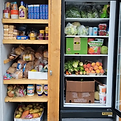
A BIT ABOUT US
The Food Share Network was formed in 2013 in consultation with more than 40 community groups who recognized a need to collaborate on innovative approaches to increase food security in the Capital Region. Today, the network has grown to over 65 community agencies.
The Food Share Network is an innovative umbrella that enhances food security in the Capital Region through collaboration and cooperation among food banks, community centers, Indigenous organizations, schools, donors, and other community organizations. Participating organizations share the common values of empowerment, dignity and respect, food and community, stewardship, and collective impact. There is a broad consensus on shifting the focus toward food security and self-reliance as a means to create a healthier and more resilient population.
Meet Our Board
_____________
ANNUAL HIGHLIGHT REELS
Our Members
We are honoured to serve the South Island alongside our amazing Food Share Network Members:

Aboriginal Coalition to End Homelessness

Aids Vancouver Island

African Art & Cultural Community

BC Housing - People, Plants & Homes

Anawim House

BC Muslim Association - Victoria

Beacon Community Services

Coastline Church

Cook Street Village Activity Centre

Burnside Gorge Community Association

Community Food Support

Craigflower Elementary School

Camosun College Student Society

Connections Place

CRFAIR

Cridge Centre for the Family

Esquimalt Neighbourhood House

Fateh Care

Esquimalt First Nations

Fairfield Gonzales Community Association

Galiano Community Food Program

Esquimalt Church of the Nazarene

Fernwood Neighbourhood Resource Group

Goldstream Food Bank

Help Ukraine Vancouver Island

James Bay Community Project

Life Cycles Project

House of Mercy

James Bay New Horizons

Living Edge

House of Shiloh

James Bay United Church

Mayne Island Food Bank

Northpark Neighbourhood Association

Our Place Society

Quadra Village Community Centre

Oaklands Community Association

Pacifica Housing

Rainbow Kitchen

O.U.R. Ecovillage

Pauquachin First Nation

Red Cedar Cafe

Rockheights Middle School

Sanctuary Youth Centre

Sidney Rotary Club (Sidney Elementary)

Rogers Society

Sooke School District 62

Songhees First Nation

Saanich Neighbourhood Place

Shelbourne Community Kitchen

Silver Threads

Sooke Family Resource Society

St. Vincent De Paul

Tsawout First Nation

Soroptomists International - Victoria Westshore

The Mustard Seed

VIHA - Dietitians

St. John the Divine

Threshold Housing Society

Victoria Cool Aid Society

Victoria Immigrant & Refugee Centre

YMCA Young Moms & Pandora Youth Housing
Victoria Native Friendship Centre

1UP Single Parent's Resource Centre

Victoria Women's Transition House
OUR MISSION, VISION, VALUES, AND GUIDING PRINCIPLES
The mission of the Food Share Network is to enhance food security in the Capital Region through collaboration and cooperation among an innovative umbrella of organizations, including food banks, community centers, donors, and other participating organizations.
The vision of the Food Share Network is that all residents of the Capital Region enjoy food security.
The values of the Food Share Network are:
-
Empowerment - self-sufficiency, mutual aid, choice, circles of support
-
Dignity and Respect - meeting people where they are at, access to local food, quality
-
Food and Community - connections & relationships, learning, culture, opportunities to contribute, sharing
-
Stewardship - accountability, transparency, best use of resources
-
Collective Impact - collaboration, efficiency, coordinated services, cooperation
The guiding principles of the Food Share Network are:
-
Enhanced partnership, collaboration, and cooperation among food-serving organizations
-
Improved efficiency and safety for people accessing non-profit food services, along with strengthened community links and access to resources that support self-sufficiency
-
Increased involvement of people served in creating food security and food literacy
-
Improved quality and suitability of food services, with increased provision of fresh, local, organic, and culturally appropriate food
-
Improved coordination of food distribution, with greater efficiency for donors and service providers
-
Improved environmental performance of non-profit food operations
-
Respect for existing donor and recipient relationships











.png)
